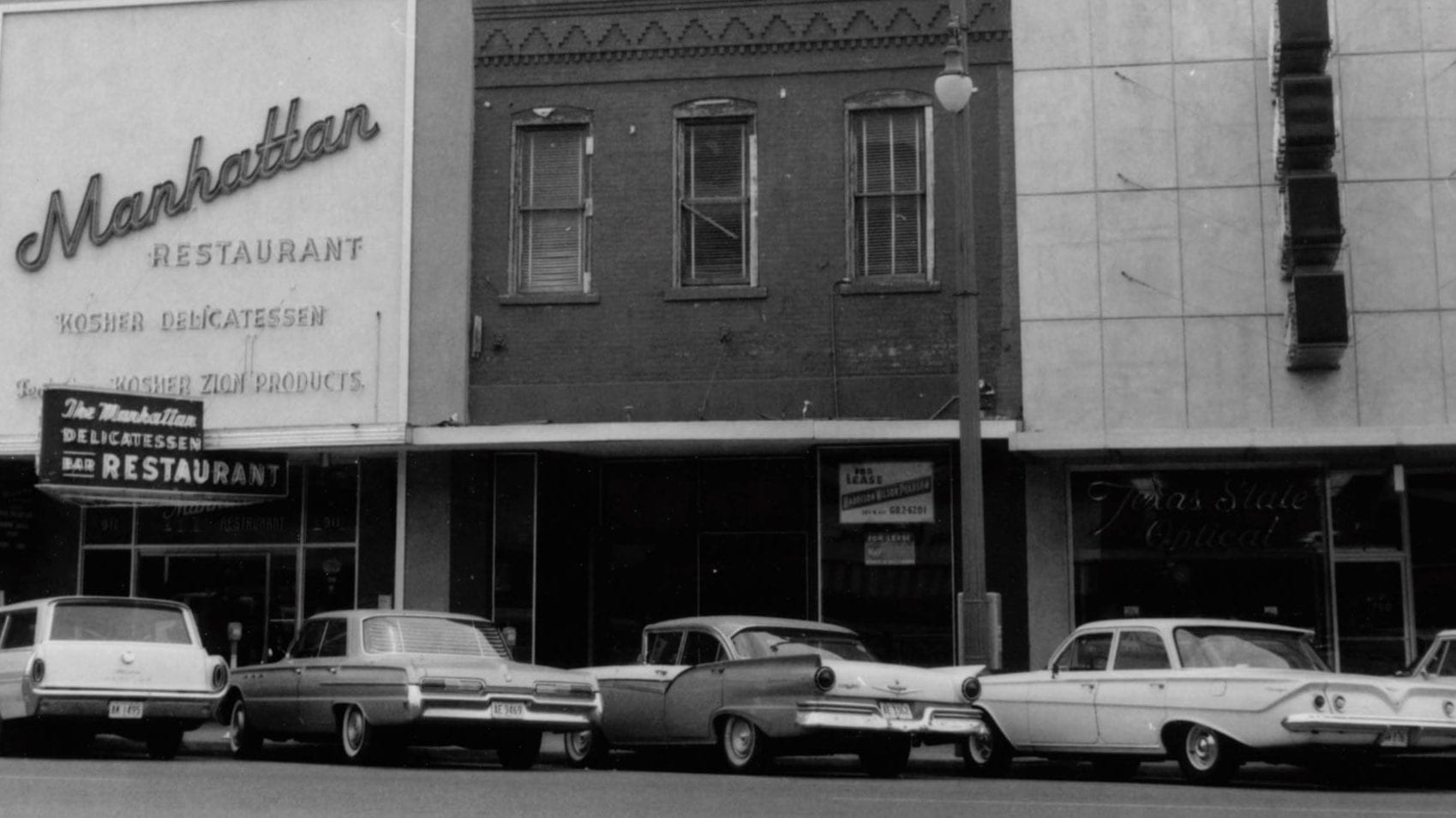
In February 2022, the Texas Historical Commission (THC) approved an application prepared by public history graduate students Amber Leigh Hullum and Railey Tassin to fully fund an Official State Historical Marker for the Manhattan Club. The Manhattan Club was one of Austin’s first queer-friendly public spaces located in the back of a Jewish Deli at 911 Congress. The Club operated from 1957 to 1969.
CBS Austin interviewed Hullum and Tassin about their research on the Manhattan Club. You can read some of Hullum and Tassin’s scholarship on the Manhattan Club in the Handbook of Texas, an online encyclopedia of state history.
Hullum and Tassin successfully nominated the Manhattan Club for the THC’s Undertold Marker Program. The THC selects a handful of sites each year that commemorate “undertold stories” and fully funds the manufacture and installation of Official State Historical Markers. The Manhattan Club was the only site in Travis County selected in 2022 and one of 15 sites selected for this program statewide. The Manhattan Club is also the first site commemorating LGBTQ+ history to receive an Official State Historical Marker as part of this program.
This successful marker project began in a public history graduate course at Texas State taught by Dr. Ruby Oram. She asked Hullum and Tassin to explain why they chose to research the Manhattan Club and the significance of the site receiving a state historical marker.
Dr. Oram: How did you first find out about the Manhattan Club?
Hullum and Tassin: We were in Dr. Oram’s Local and Community History class and one of our projects was to write up a narrative for a possible historical marker with an “undertold story.” Neither of us had ever seen a historical marker with an LGBTQ+ topic, and we knew that we wanted to try and find something– anything– that could help fill that void. We teamed up to work on the project together and then began looking for any leads to follow. We first started with good old Google and stumbled upon a list of Austin’s gay bars and clubs and the years that they had opened. On the list was an establishment called Manhattan Club, which had opened more than 50 years ago. Thus started our trip down the rabbit hole.
Dr. Oram: Why did you choose the Manhattan Club for this project?
Hullum and Tassin: People often think that history is nothing but names and dates with no connection to the present. For most Texans, we are taught that history is a bunch of old white men that did some great things (aka boring). But really, history is people. It’s all of us. It’s the everyday. It’s women, and people of color, and disabled people, and gay people, and immigrants– the list goes on. We chose a site that many people can relate to. The Manhattan Club was a gathering place, a place of community. It was a safe place for LBTQ+ people to come together during an era when it was dangerous to be openly queer. We wanted to tell that story through the Manhattan Club. People want to see themselves in history, so hopefully through this historical marker we can help pull out that mirror.
Dr. Oram: Why is it significant that the Manhattan Club receive a state historical marker?
Hullum and Tassin: Historical markers are one of the most accessible forms of public history, serving as a physical representation of significant moments, people, and places. Identifying the location of the Manhattan Club with a marker will make LGBTQ+ history more visible within the public landscape of Austin. It is especially significant due to its placement on Congress Avenue, only one block south of the Texas Capitol building. Additionally, as the first undertold historical marker commemorating queer history, it will hopefully set a precedent for future research and recognition.
Dr. Oram: What’s next? Any plans for the marker unveiling?
Hullum and Tassin: As of right now, we are taking the final steps to confirm the marker’s location, in collaboration with the Travis County Historical Commission. Once the marker inscription is finalized by the Texas Historical Commission, the marker will be ordered and installed. We are hoping to work with the City of Austin and other organizations to put on an unveiling event (date TBA) for everyone to come together and celebrate Austin’s LGBTQ+ past and present.
Image: Austin History Center
